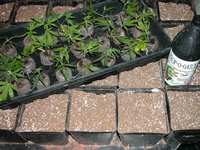Contributed by:
Leaf
Submitted: 02-10-2003
Introduction:

Many people say that they do not like to
clone with peat pellets because the plant's growth is
stunted or they see growth mutations. I believe this is
for one of two reasons;
- the peat is dense and
doesn't allow enough oxygen to the roots when the
cutting first takes, oxygen being critical for normal
growth
- the nylon surrounding the peat pellets,
although easy to tear, is difficult for delicate
marijuana roots to penetrate. The nylon may resist roots
from expanding in size.
I first noticed mutated
and stunted growth on a small plant, so I ripped it out
of the soil and examined what could be causing this
plant to be held back and not achieve its full
potential. I noticed some of the roots emitting from the
peat pellet were as thick as my finger but bottle necked
through the restrictive nylon. This has lead me to
experimentation, and for the last few years, I've been
using the following method with great success.
Pellet preperation As far as I
know the standard pellet size is 1.5" but I have seen
little 'mini' pellets with new propagation trays in
Wal-Mart etc, they look to be about 3/4" - I'm sure any
size would work.. although anything much larger may not
ever have protruding roots...
I float my pellets
in a container of cool tap water (which contains low
ppm's of chlorine) - essentially the chlorine would
sterilize whatever is in there. I also add the
recommended amount of 'No-Damp' when I soak my pellets.
Once my pellets have saturated as much water as
they can hold and have full expanded, I gently squeeze
them so they do not hold much water - kind of like a
damp sponge. If you were to squeeze a properly prepared
pellet, you may get one drop of water or water will wet
your fingers but not drip.
You don't really want
it much drier than that either. After that, once they
have a cutting in them and they are under a dome,
misting of the foliage is all that should be
needed...they shouldn't dry out before you have roots.
Cloning I like to place my newly
rooted cuttings into containers of soil and water them
with a root growth accelerator and B1 to reduce shock
and to kick start new growth. If I have a long stem
before any leaves, then I'll plant deep. If the stem is
short, then I plant it deep enough to ensure that all
roots and scarification is beneath the soil.
Another thing I'd like to mention about peat
pellets is that it is very important when you first have
them to allow them to fully expand before placing new
cuttings into them. You will see root growth from the
bottom of your pellets if you have allowed your pellets
to properly expand and become soft (Pellet are initially
very hard).
Preparing the rooted clone
You are ready to apply this method once a
cutting has shown root growth emerging from the pellet?s
mesh.
Gently
take your clone and very carefully start to tear away
the nylon from the top. Slowly peel away torn sections
of the mesh from the pellet being very careful around
the roots because they will easily break off. Once
you've successfully removed the mesh from most of the
pellet, then you will need to gently slide the mesh off
the length of the roots, being very careful not to
damage the very delicate roots. You may need to pull the
nylon from either side to stretch the holes to allow
roots with more girth to easily slide out. Expect to
break off a few roots, especially your first couple
times attempting this.
Now you have removed the
nylon meshing, your roots are no longer restricted.
However, your newly rooted cutting is still encased
within the dense peat pellet. Gently break off pieces of
the peat and remove them being careful not to damage or
break any roots. Remove as much of the peat as you can
safely, and at times you can squeeze sections of the
peat to make it crumble away if it is being held on by
roots. You can see in second to last image I have
applied the scarifying method to this cutting - it is
showing lots of new root growth up the length of the
stem.
Learn about root scarification
here... Planting
Once
you have removed most of the peat, you can continue
planting your newly rooted cutting as normal. Once
again, it is important to apply this method as soon as
you have roots emerging from the nylon meshing else it
makes it very difficult to remove the mesh without
damaging many roots. Also, it makes removing more of the
peat material easier if the peat is not filled with
roots aswell which would make things much more
difficult.
Happy rooting!